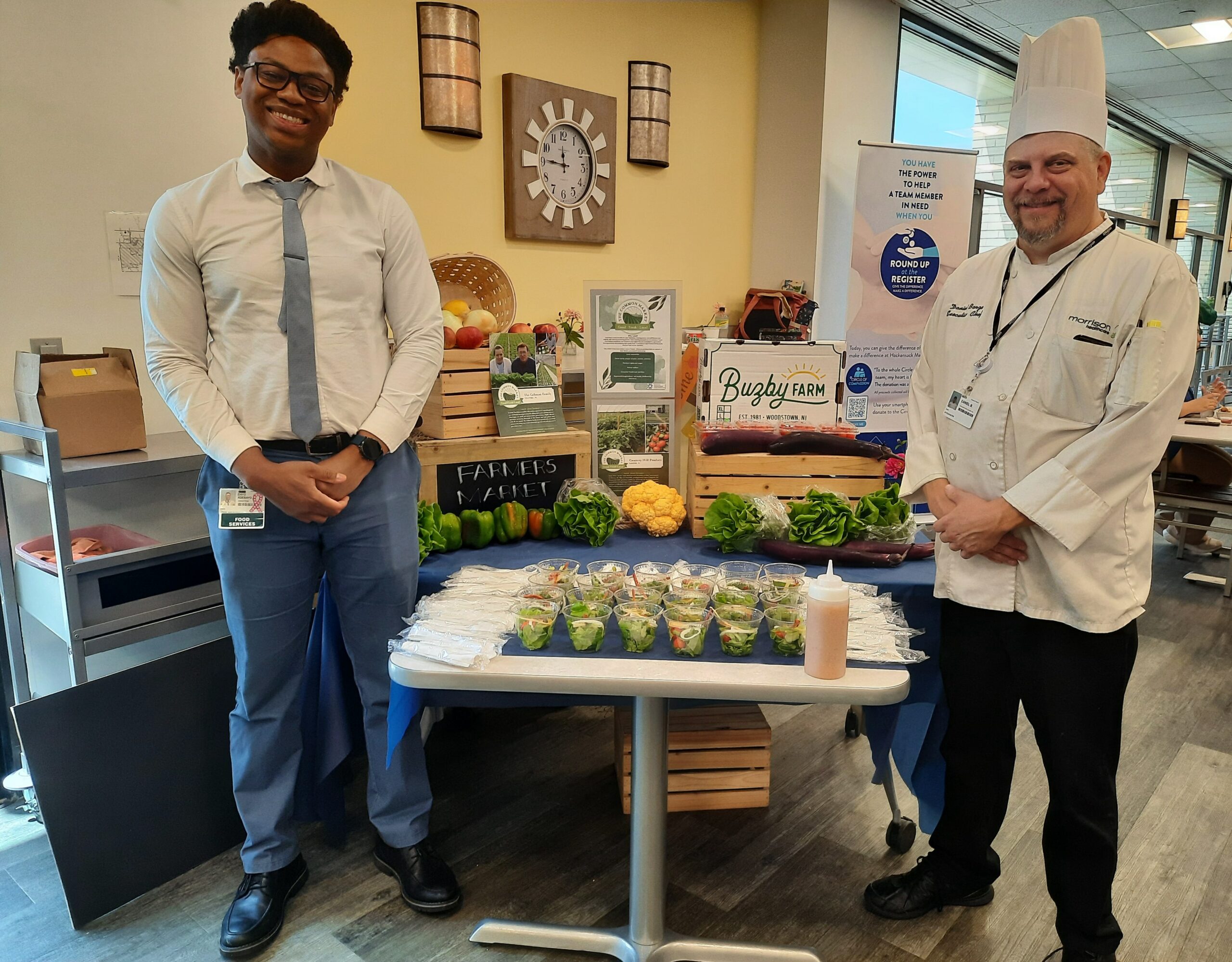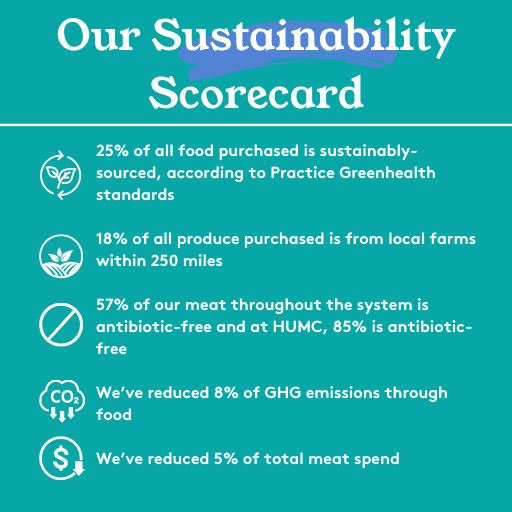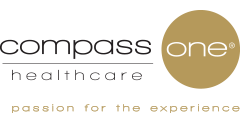An Interview with Lisa Roberson, National Director, Wellness and Sustainability at Morrison Healthcare and Kyle Tafuri, Vice President of Sustainability at Hackensack-Meridian Health
Health systems and foodservice operators play a role in helping patients and communities think differently about their experiences with food. Hear from our experts on how building an equitable and sustainable food philosophy can help strengthen local communities.
Watch the full video below or keep scrolling to read.
—
This video is part of Compass One Healthcare x HealthTrust Podcast Series.
—
There’s been a stigma around patient dining and hospital food for decades. Has this changed?
Lisa Roberson: I don’t think the opinions about hospital food have changed much. Many people feel like hospital food is a punishment. At Morrison, our chefs are putting out a lot of healthy but also delicious food that is beginning to change this impression. Hospital food is the first opportunity that we have to promote food as medicine. And it’s incredibly important that we serve the right kind of food for healing patients.
There’s been a big push to put a focus on food as medicine—making the patient understand that in order for you to get better and get out of the hospital, you need good, healthy food.
Kyle Tafuri: We’re really seeing the evolution of food and healthcare, whether it’s aligning with population health, or ensuring that healing food is what we are serving to patients. We’re also seeing different kinds of pillars. We’re looking at more local, sustainable food, and we’re supporting local farmers. We’re trying to make sure we’re putting those dollars into our communities, while also looking outside of the four walls of the hospital. Addressing food insecurity with medically tailored meals and really changing the conversation. It’s not just about serving food in the cafeteria or in the patient room. Now, it’s really going beyond that and evolving to truly healthy hospitals.
What does it mean to a community when a hospital starts giving back to the community by buying local food? What do you see from that?
Lisa Roberson: We have the opportunity to use the power of our purchasing strategy to help support local communities, to support small and local business owners and to create an environment where an economy can flourish, even local farm economies. It’s not just about purchasing and supporting economies, it’s also about providing a health benefit to the patients and person that we’re serving the food to; it’s fresher and more nutritious.It’s really the right thing to do.
Do you see that from the patients when they know they’re getting served food that was just grown a couple of miles away? How does that impact the patient?
Kyle Tafuri: As with anything, you want to know where your food comes from. I think that’s something that’s changed. Whereas in the past, you got just a boxed lunch– or your food travels from around the world— but now, when they know it’s coming from farms, it’s comforting to the patient.
Why is the food philosophy so important for what we do at Compass One for Hackensack Meridian Health to be on the same page?
Lisa Roberson: That’s the first question (we ask our clients). How do we get started? What do we do? The food philosophy actually is the first opportunity for a hospital to decide: what do we want to stand for? So, a food philosophy really defines what a hospital stands for, but it also is an opportunity to be different from other hospitals. It can be a way that a hospital brands itself through how they approach food and how they promote healing. Everybody eats, and so your food philosophy is an opportunity to be a differentiator.
How does that partnership really enrich your hospital?
Kyle Tafuri: I think you mentioned the key word—partnership—and how we’ve been able to truly excel with our program has been in partnership with Morrison Healthcare because there has been a lot of changes in the industry. You can’t do it alone or you fail. And in this case, we had a lot of alignment. If there was something out of alignment, we just addressed it— and boom, it excelled becoming a thousand times better than what we had planned. I think food, as you mentioned in the beginning, food is medicine. At the end of the day, hospitals are about health and we’re seeing that evolution towards prevention.
One of the biggest things in that philosophy is the road to sustainability. Expand upon that a little bit for me.
Lisa Roberson: We talked a little bit about the impact local sourcing has on sustainability. But this leads to more questions: Do we have growth hormones in the milk? Are we making sure that we’re sourcing dairy that is pure or from a single farm? Are we sourcing seafood that’s sustainable? Are we operating in a sustainable way? So, reducing food waste, making sure that our operation runs smoothly and is mindful about what we’re putting into the landfill, how we’re impacting the climate with greenhouse gas emissions–this all comes from food. We have a lot of power to make change, and I think sustainability is really important. Kyle said we have a lot of experience as a company, but it’s only experience. The experience only goes as far as the partnership. That’s where you really get that ability to make change. It’s different when you combine the experience we have with collaboration in a deep partnership and understanding the goals and moving towards those goals together. I think that’s something that we would both agree upon. As far as what we do for Hackensack Meridian Health, the facility is trying to move it to a more sustainable foodservice operation.
Kyle, what are your thoughts on sustainability and how it plays in your role?
Kyle Tafuri: When you talk about food, it’s not only the food that we’re serving to the patients, but how that food is produced. I think that what’s been so beneficial— I don’t want to say “easy”—because none of this work has been easy. Our work has been around aligning this with our strategic priorities and sustainability and health. So, antibiotic free meat and antibiotic resistance is a huge issue. Globally getting antibiotics out of meat. 80% of antibiotics in this country were going towards meat versus people. Of that, 70% was the same antibiotics that we were prescribing people. At the end of the day, we’re focusing on eliminating antibiotics and only prescribing antibiotics when it’s absolutely medically necessary. But when 80% is in the food we eat, that is tough. So, that was something that we tackled. There are other pieces. Why are we serving sugar sweetened beverages in the hospital? Why are we serving fried foods? And it’s part of a journey forward, but it’s something that’s in line with our mission.
Why is diversity such an important part of the philosophy that we have?
Lisa Roberson: I think diversity is one of the biggest buzzwords in healthcare right now, and it is for a good reason. If you’re a hospital and you’re not focusing on diversity, then we’re not really functioning at our fullest capacity in bringing people together and also supporting equity. And that’s one of the most important challenges today. I think about our food service operation. We have a large company and we purchase a lot of food. We have a lot of opportunity to make change with the dollars that we spend. So, I feel a responsibility to use that purchasing power to support producers of color. We can build health equity. We can build capacity and resiliency in the Food Network. There’s a lot of small business owners that really could benefit and help us create a unique food service environment. People come together through food. We celebrate around food. And food comes from all different regions, all different cultures. I think when we talk about the importance of diversity, it’s bringing all of these different regional cuisines together. And that brings inclusivity in a hospital environment. And it’s just the right thing for people. So, diversity can bring people together in a hospital through celebration.
At Hackensack Meridian Health, you are focused on that as well. Talk a little bit about that.
Kyle Tafuri: We need to be responsive to the communities that we serve. So, when we talk about diversity, we have 18 hospitals throughout the state. And food is something that should reflect all of the different groups of people that we’re serving in our hospitals. When we look at the supply side, we look for new opportunities. During COVID, a lot of farms were getting hit hard with businesses being shut down, schools being shut down. We found and partnered with an organization that gives out fresh boxes of local produce. Common Market distributed food in our vulnerable communities. Fast forward, they have a program partnering with producers of color.
There is an impact when patients and visitors see their culture demonstrated through the food in a hospital. How so?
Lisa Roberson: There’s a huge impact – as I mentioned, patients feel included and acknowledged when they see food from their culture available – and we’re broadening our scope. We have some Filipino options that are coming up, which is kind of near and dear to me and my culture. We have Latin cuisine, Caribbean cuisine, and lots of different varieties coming out. There is a lot to look forward to.
What are some of the elements of a successful program?
Kyle Tafuri: I think the first key is to ask: when are you starting? A lot of times folks wait and try to find the perfect time or make sure that everything’s together. When you wait, nothing’s going to happen. You have to just get started. Success is about finding champions and aligning the components of the program. And really making sure that you have some solid senior leaders on board and supporting it, while also being flexible and jumping on opportunities as they arise.
Lisa Roberson: For me it’s about collaboration and having a great partner. That means bringing experience to the partnership from our organization and working to build a vision. I think that’s what’s been so beneficial with working with Kyle, is that he had a vision that we were able to really understand and support. You need to create the food philosophy, build the food philosophy, decide what you stand for, and then bring in the right tools. That’s where we come in, to bring in the right tools such as, do we want food pantries? Do we want a farmer’s market? Do we want teaching kitchens that engage the community or educate staff? Once you establish your philosophy, you have to be flexible too. I think that’s where both collaboration and communication come into play. And honestly, things change so quickly. Even the food service environment has changed. We’ve changed our approach many times to make things happen. So, I think having the right partnership, the right plan in place, and keeping some of the basic tools and combining it, with our ability to execute it all works out.
Hackensack Meridian Health’s Sustainability Impact
Better Together:

In partnership with Morrison Healthcare, Hackensack Meridian Health consistently sources local and sustainable food ingredients through viable partnerships designed to support greener practices and decrease antibiotic resistance. From their plant-forward menus– to sourcing humanely-raised animals and wild-caught seafood– this commitment is woven into their practices, processes, and culture. Their top priority is sourcing meats raised without antibiotics as part of our efforts to decrease antibiotic resistance in people and keep antibiotics working in our hospitals.
Serving Less Meat, Better Meat for Improved Health and Climate
By reducing our meat consumption by more than 21% at hospitals throughout the system, Hackensack Meridian Health became the largest health system in the nation to join the Cool Food Pledge, founded by the World Resources Institute to help organizations reduce their climate impact by promoting more plant-based foods. The network reduced its total food-related emission by over 40%, making the network one of the leading organizations in terms of overall reductions.

Building Equity with Community Farmers
We work closely with Common Market, a nonprofit that supports local farmers and producers across the country, helping our chefs build relationships with Black-owned farms, like Geogreens Farms and K&J Organic Farms to both plan and procure produce featured regularly in their retail cafés.

Hackensack Meridian Health has been recognized by Practice Greenhealth, the nation’s leading organization dedicated to sustainability in healthcare, receiving a Top 25 Environmental Excellence Award, Practice Greenhealth’s highest honor, including Hackensack University Medical Center, Jersey Shore University Medical Center and Ocean University Medical Center. Hackensack University Medical Center has received this award nine times – every year since it was created. Our people, processes, and partnerships help us advance these sustainability initiatives, and secure a better future for the patients, guests, and caregivers at Hackensack Meridian Health.
The Morrison Healthcare foodservice team further reinforces Hackensack Meridian Health’s sustainability commitment by continuously educating and demonstrating the importance of these initiatives through thoughtful menu design, retail promotions, and community teaching kitchens—while prioritizing a collaborative and intentional sourcing strategy.


